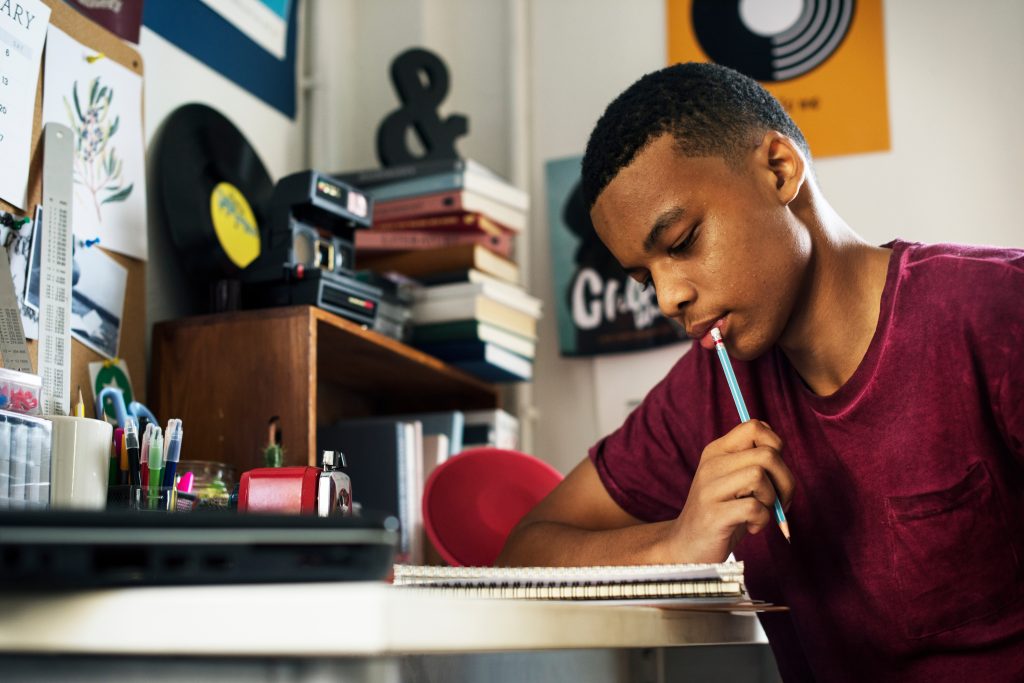 As students progress through school, expectations around study skills steadily increase. In lower grades, kids are generally expected to write down what’s on the board and may be given a teacher-prepared study guide for a unit test; in upper grades, they’re expected to consistently review material in preparation for cumulative exams, and develop individualized note-taking strategies that might vary by course. For most students this progression is a steep learning curve. But for students with executive functioning challenges, learning how to study is further complicated by struggles with prioritizing information, maintaining focus, planning, and time management.
As students progress through school, expectations around study skills steadily increase. In lower grades, kids are generally expected to write down what’s on the board and may be given a teacher-prepared study guide for a unit test; in upper grades, they’re expected to consistently review material in preparation for cumulative exams, and develop individualized note-taking strategies that might vary by course. For most students this progression is a steep learning curve. But for students with executive functioning challenges, learning how to study is further complicated by struggles with prioritizing information, maintaining focus, planning, and time management.
What is studying?
In the simplest sense, studying is the act of teaching yourself information. Explaining how that happens successfully will help your child understand why some study strategies work better than others.
Start by introducing the role of memory. When your child studies well, they transfer information from short-term to long-term memory. Here, point out that the brain is almost always in “forgetting mode” because most of what happens during the day doesn’t need to be in long-term memory. It’s important for their brain to let go of lots of information, precisely so it can work efficiently when it needs to. What did you eat for breakfast last Monday? Who cares! But what were the causes of World War 2? That’s worth remembering when taking your social studies exam.
Studying needs to be a conscious choice to shift the brain into “remembering mode.”
Scientific studies show that most people need to see a piece of information at least four times in order to remember it. In between those exposures, it’s important to sleep because that’s when the brain moves information from the hippocampus (where short-term and working memory reside) to the cortex (where long-term memory lives).
Science also tells us that recall is superior to review and we tend to remember information that we connect to what we already know. All this means that successful study plans include these practices:
- Exposure to information four or more times over multiple days
- Respecting our sleep schedules over multiple days
- Speaking, moving, or making something topic-related
- Making explicit connections to prior knowledge
Ongoing Routines
For subject areas that are particularly challenging for students, the best approach to studying is to establish a routine that leads to ongoing review of material. Here’s how that might look:
Exposure 1: Take notes during class. A good entry level method is to write down the three most important ideas in each class. (For more advanced note-takers, the Cornell Method is well proven).
Exposure 2: On the day that material is delivered, identify key words or concepts and write down any questions for clarification. (For Cornell Notes, complete the left-hand column).
Exposure 3: The day after material is delivered, synthesize information. This might mean summarizing notes in 1-2 sentences or writing possible test questions.
Exposure 4: Once a week, create a one-page summary of all of your notes for the class. Depending on the class, this might take the form of a mind-map, a timeline, or a simple outline.
Doing the above throughout the school year means that when it’s time to prepare for a test, your child will already have learned most of the information, and test preparation should be a relatively low-stress process.
Jenna Prada, a certified teacher and administrator, is the founder of the Learning Link and the Director of Executive Functioning & Special Education at Private Prep.
